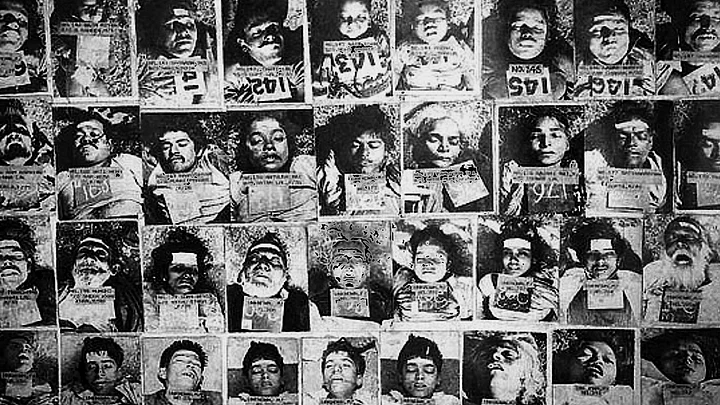As has become the norm, each year the date of the Bhopal gas disaster of 1984 is marked by grief and dimming hope. Many of the original victims are now dead, but their children and grand-children are still bearing the brunt of what is now regarded as the worst industrial disaster in history.
A statement released on 2 December by a victims’ collective is a searing indictment of successive governments’ and all political parties’ calculated apathy towards the plight of the sufferers. However, the role of India’s Supreme Court, and some of the biggest stalwarts of the legal fraternity usually goes unnoticed and escapes criticism.
Judicial Cop-out
In public perception, the Supreme Court and a phalanx of its judges, are often held to be the protectors of the rights of the hapless and downtrodden. It is true that in many cases, the court has taken giant strides for the sake of public interest and in the process created a body of jurisprudence which is highly spoken of all over the world. However, as far as Bhopal is considered, the court’s legacy would always remain mired in controversy. Many would even venture so far as to label it as “toxic”.
There are reasons for this criticism.
Colin Gonsalves, prolific public interest lawyer, writing in the journal Economic and Political Weekly in 2010, elaborated upon how the court, by its insistence upon strict legalese, bestowed benevolence on those responsible for the deaths and sufferings of the fifteen thousand who perished, and many more whose lives will be cut short because of inherited ailments.
Mincing no words, Gonsalves ripped apart the Supreme Court’s 1989 constitution bench judgement which absolved Union Carbide Corporation (the India subsidiary of US -multinational Dow Chemicals) of any criminal liability. The court’s ruling came despite it being common knowledge that the company’s criminal negligence was the reason why the lethally toxic methyl isocyanate gas leaked and spread death and devastation all around.
Not only that, the court admonished the victims for not filing their claims on time —despite being aware of how they were reeling from poverty and serious illness.
The Supreme Court’s Second Blow
The Supreme Court struck yet another blow in 2011 by dismissing the CBI’s curative petition against the 1989 judgement, on the grounds that there was an inordinate delay and that it fell below the legally-permissible threshold.
Legal Ethics Prevailed Over Humane Feelings
Fali S. Nariman and Soli J. Sorabjee, two of the most distinguished lawyers and jurists in India, also stand accused of aggravating the victims’ suffering. Sorabjee, in his capacity as the then Attorney General of India, argued against the victims being granted a hearing, and the Supreme Court accepted his contentions.
The accusations against Nariman are more serious. He was Union Carbide’s lead counsel in the Supreme Court, and brokered the settlement by which the company got away with just paying compensation, the amount of which has always been criticised as paltry.
A lawyer has both a legal and ethical duty to take up a case, and leave the task of judging his client’s guilt or innocence to the court. But this poses a profound question- should adherence to ethical principles be devoid of any humane considerations ?
This is precisely what Upendra Baxi, another noted legal scholar, asked Nariman. In a public exchange, as reported in detail in Outlook Magazine, Baxi accused Nariman of complicity, stating that he ‘assiduously promoted an unconscionable settlement’. Till date, Nariman has maintained that he only did his job, and has tried to give disarming replies to Baxi’s charges.
The Bhopal catastrophe and its subsequent judicial aftermath remains an enduring travesty. With every passing year, more victims fall silent. But should that hold us back from criticising some actors who contributed to it in no small measure?
